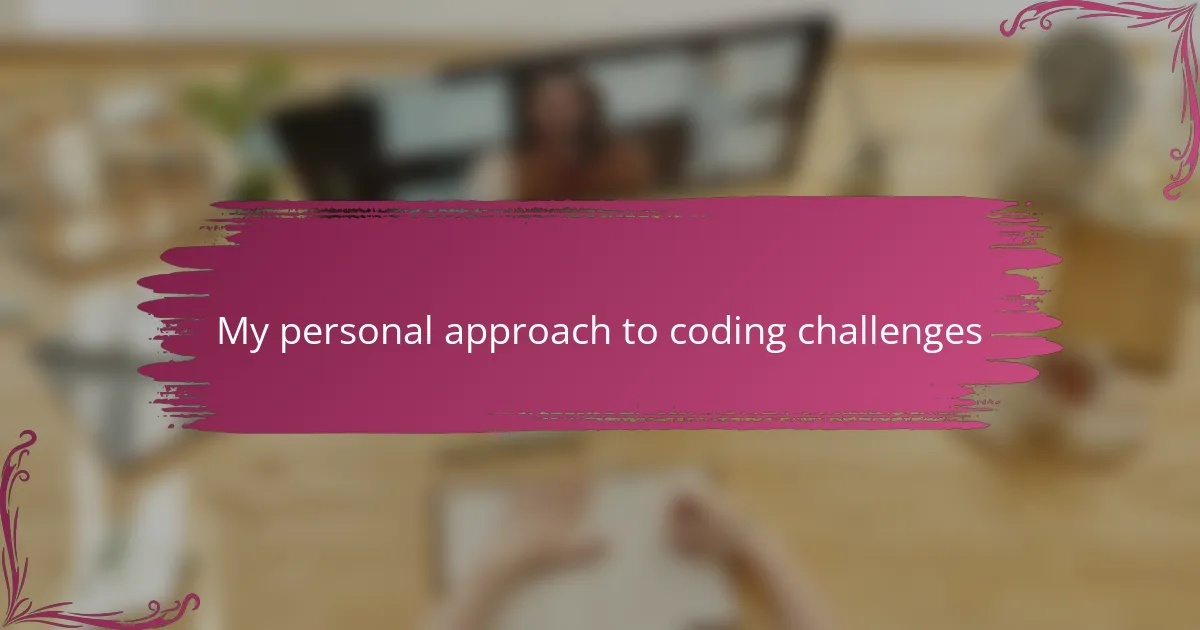Key takeaways
- Coding challenges enhance problem-solving skills and boost confidence in programming by encouraging users to think critically and apply algorithms and data structures effectively.
- LeetCode offers a structured environment with a variety of problems, fostering community engagement through discussions that provide new perspectives and techniques.
- Breaking problems into smaller parts and documenting thought processes can clarify approaches and reduce overwhelm, leading to more effective solutions.
- Consistent practice, including engaging with slightly more challenging problems and reviewing community solutions, significantly improves coding abilities over time.

Introduction to coding challenges
Coding challenges have always intrigued me because they push you to think beyond the usual. Have you ever faced a problem that seemed impossible at first but felt immensely satisfying once solved? That’s the core appeal of these challenges—they turn problem-solving into a rewarding puzzle.
I remember the first time I tackled a tricky algorithmic problem; it felt like trying to unlock a secret code. The process can be frustrating, but that moment when everything clicks is truly exhilarating. It makes you realize how much you can improve with practice.
Why do so many programmers swear by coding challenges? In my experience, they sharpen your logic and improve your ability to write efficient, clean code under pressure. It’s not just about getting the right answer but learning to think like a programmer.

Overview of LeetCode platform
LeetCode is like a treasure trove for anyone who loves coding puzzles. When I first landed on the platform, the sheer variety of problems—from easy to mind-bogglingly hard—immediately caught my attention. It felt like walking into a gym designed specifically to build your coding muscles.
One thing that stood out to me about LeetCode is how structured it is. You can filter problems by topic, difficulty, or even by the companies that have asked them in interviews. Have you ever wished you could practice exactly what’s needed for your next tech interview? LeetCode makes that possible, and I found it incredibly motivating.
Beyond the problems themselves, LeetCode’s discussion forums and solution explanations became a major part of my learning journey. Seeing how others approach the same problem opened my eyes to new techniques and ideas I wouldn’t have considered. It’s like having a coding community right at your fingertips, cheering you on and pushing you forward.

Benefits of practicing coding problems
One of the biggest benefits I noticed from practicing coding problems is how much it improved my problem-solving skills. Each challenge forced me to think differently and break down complex issues into manageable pieces. Have you ever been stuck on a problem, only to realize later that a simple shift in perspective made all the difference? That’s exactly the kind of mental flexibility coding exercises build.
Another advantage that stood out to me is gaining confidence with algorithms and data structures. Initially, terms like recursion or dynamic programming felt intimidating, but after repeatedly applying them in real problems, they became second nature. It’s like training for a marathon; you don’t just run one day and expect to finish strong—you build up endurance step by step. That steady progress made me feel more prepared for job interviews and real-world projects.
Finally, solving these problems regularly gave me a great sense of accomplishment and kept me motivated. There’s something deeply satisfying about cracking a tough puzzle, and it made me eager to tackle the next challenge. Have you ever felt that rush of excitement after finally nailing a tricky task? For me, those moments were fuel to keep improving and growing as a programmer.

Strategies for effective problem solving
When I first started, one strategy that really changed the game for me was breaking a problem into smaller parts. Instead of trying to swallow the whole challenge at once, I focused on solving each piece step by step. Have you ever noticed how tackling tiny chunks makes a huge problem feel way less intimidating? It’s like turning a mountain into a series of small hills you can climb one at a time.
Another trick I found invaluable was writing out my thought process before coding. Jotting down what I wanted the solution to accomplish helped me clarify my approach and avoid going down rabbit holes. Sometimes, just explaining the problem to an imaginary friend made the solution pop into my head. I guess that’s a way of forcing myself to understand, not just guess.
Lastly, I learned not to be afraid of revisiting problems after a break. When I returned to a challenge with fresh eyes, solutions that seemed impossible before often became clear. Have you ever stepped away from something tough, only to come back and crack it unexpectedly? That pause often turned frustration into insight, making my problem-solving more effective over time.

Common challenges faced on LeetCode
One challenge I often faced on LeetCode was dealing with time limits. Sometimes, my solution was logically correct but too slow to pass the test cases. Have you ever spent ages tweaking your code to shave off just a few milliseconds? That struggle taught me the importance of writing not only correct but also efficient code.
Another hurdle was encountering unfamiliar algorithms or data structures. Early on, I remember staring at a problem that required a concept I barely knew, feeling totally lost. But pushing through that discomfort turned out to be a turning point—forcing myself to learn new techniques expanded my toolkit and made later problems less intimidating.
Debugging tricky test cases was also a common frustration. At times, my code would pass some inputs but fail on others without a clear reason. That’s when I realized how crucial it is to think about edge cases and test thoroughly. Have you ever felt that mix of confusion and determination trying to find that one tiny bug? Those moments, though maddening, sharpened my attention to detail immensely.

My personal approach to coding challenges
When I approach a coding challenge, I always start by reading the problem carefully—not just once, but a couple of times. I ask myself, “What is this really asking me to do?” Sometimes, it’s tempting to jump straight into coding, but I’ve learned that pausing to fully understand the problem saves me a lot of headaches down the line.
I like to break the problem into chunks I can handle one at a time. By tackling smaller parts, I feel less overwhelmed and more in control. Have you ever noticed how a big problem can suddenly seem manageable when you stop looking at it as one massive block and instead view it as a series of smaller steps?
One habit that’s made a big difference for me is writing down my thoughts before typing any code. Sketching a quick plan or even explaining the problem out loud helps me clarify my strategy. It’s like having a conversation with myself—sometimes the solution emerges simply because I’ve forced myself to slow down and think it through clearly.

Tips for improving coding skills on LeetCode
One tip that really shaped my progress on LeetCode was to consistently tackle problems just a bit beyond my comfort zone. Have you ever noticed how sticking only to easy problems feels safe but doesn’t push your limits? Gradually stepping up the difficulty challenged me to learn new algorithms and think more creatively, which was both humbling and exciting.
Another habit I found invaluable was reviewing solutions from the community after I solved a problem. Sometimes, I was amazed at how others approached the same challenge with cleaner or more efficient code. Reading those discussions didn’t just expand my toolkit—it gave me fresh perspectives and sparked ideas I hadn’t considered, which made me a better programmer overall.
Finally, I learned the power of repetition. Returning to previously solved problems after a few weeks helped reinforce concepts and improved my speed. Hasn’t it ever happened that what once seemed complicated suddenly clicks when you see it again? That reassurance kept me motivated and proved that consistent practice truly pays off on LeetCode.